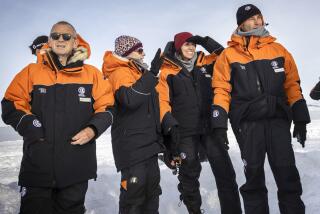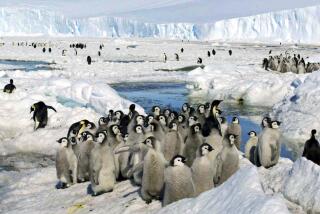U.S. Urged to Lead in Saving Antarctic : Environment: An international conference will propose that the continent be designated a world science park.
- Share via
WASHINGTON — The United States risks losing an unusual opportunity to assert global leadership in protecting Antarctica, Sen. Albert Gore (D-Tenn.) said Thursday on the eve of an international conference on the future of the frozen continent.
Gore spoke at a news conference sponsored by the Alliance for Antarctica, a coalition of environmental groups. It is calling on the United States and other nations participating in the conference, which begins Monday in Chile, to designate Antarctica as a world science park.
Rep. Bruce Vento (D-Minn.), chairman of the House Interior subcommittee on parks and public land, said he fears that recurring degradation has made Antarctica “an environmental time bomb ready to explode.”
“We have no time for half-measures if America is to be the world’s leader in protecting Antarctica,” Vento said.
Congressional legislation calling for preservation of Antarctica is awaiting President Bush’s signature, but there has been speculation that the Interior Department might urge Bush to veto the measure. The legislation for the first time would apply U.S. environmental protection laws to any activity in Antarctica sponsored by an agency of the U.S. government. It also would prohibit U.S. exploration or development of minerals in Antarctica.
The United States “should be leading the way and trying to protect the island instead of trying to protect the mineral convention,” said Rep. Wayne Owens (D-Utah), who introduced the measure in the House. Gore was its Senate sponsor.
The focus of a dispute between Congress and the State Department is the ratification of the Convention on the Regulation of Antarctic Mineral Resources Activities, on which the State Department has worked for six years.
The convention, signed two years ago but not ratified by 17 of 20 nations, would regulate mineral exploration but not ban it, as the congressional action would. The French and Australian governments are now against the accord, saying that no international agreement that would endorse even strictly regulated exploitation of Antarctic mineral resources could be acceptable to either government. If all 20 nations do not ratify the pact, it is dead.
Mining in the Antarctic is not compatible with the protection of the continent’s fragile environment, many environmentalists contend. French oceanologist Jacques Cousteau, in an interview with the New York Times last year, declared that an oil spill in the Antarctic could damage the food chain for decades and affect the entire hemisphere.
But Tucker Scully, director of the office of ocean affairs at the State Department and the lead U.S. negotiator for Antarctic issues, disagreed with the hands-off approach to the continent. “Creating a world park is to stick one’s head in the sand,” he said.
According to environmentalists, Antarctica is being marred by air pollution and tourist ships and threatened by mining. They also believe that the continent is being damaged by scientists who come to unlock its mysteries. They burn their garbage in pits and dump their junk in a landfill by the sea, they charge.
“We treated Antarctica like a frontier town,” said R. N. Andersen, the National Science Foundation’s deputy general counsel. Congress has funded a five-year, $30-million program to clean up the Antarctic environment. More than 76 scientific projects are now under way on the continent.
During the peak summer months, about 4,000 people inhabit Antarctica, and tourism is increasing rapidly. Last year, about 3,000 people paid more than $10,000 each to photograph penguins and view the vast sweeps of ice and rock.
More to Read
Sign up for Essential California
The most important California stories and recommendations in your inbox every morning.
You may occasionally receive promotional content from the Los Angeles Times.













